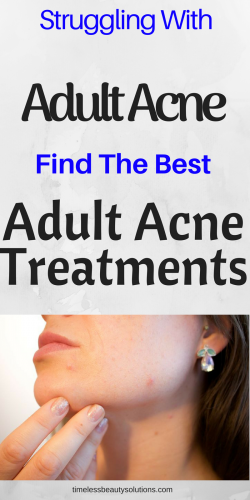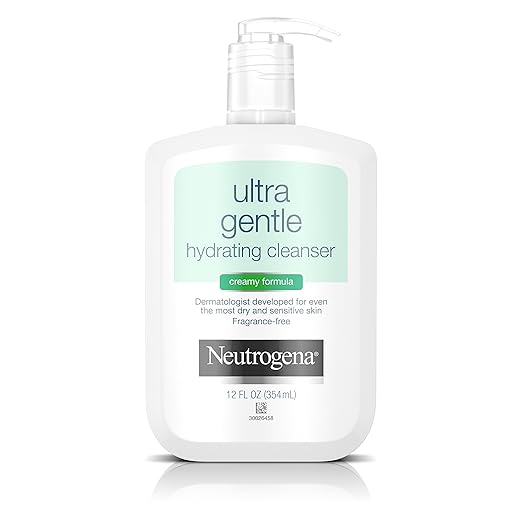To be able to fight adult acne successfully, you first need to understand what causes adult acne of what acne is to begin with.So before we get started, it will be important to first answer the question What is Acne?
Acne is the term given to a skin condition that results when dead skin cells, dirt and oil plug hair follicles. Acne normally makes an appearance on the back, chest, face, neck and shoulders.
What many do not know is that Acne can be surprisingly persistent, although there are a number of effective treatments that are currently available.
Bumps and pimples take a long time to heal and others tend to arise as some go away and it can be a cycle of this goes and a new one appears.
Acne is particularly common but not limited to teenagers, with between 70 to 80 percent of teens suffering from some form of the condition at some stage of their adolescence.
However, younger children are increasingly starting to suffer from the condition. Serious forms of acne can scar the skin and cause emotional distress.
The chance of lasting emotional and physical damage is lessened by starting acne treatment/medication as soon as possible.
What Are The Symptoms Of Acne
The symptoms and signs of acne can vary based on the seriousness of the particular condition. Symptoms include:
-
Open plugged pores also known as blackheads, where the oil turns brown upon being exposed to the air.
• Closed plugged pores also known as whiteheads.
• Papules, which are small, tender red bumps.
• Nodules, which appear in the form of painful, solid and large lumps beneath the skin’s surface.
• Cystic lesions, pus-filled and painful lumps underneath the skin’s surface.
• Pustules, more commonly known as pimples, which are papules that have their tips filled with pus.
Adult Acne Causes
Come to think of it, what causes adult acne? this is supposed to be a teen problem and yet here you are in your thirties or older and suffering from adult acne.
There are four primary factors behind the emergence of acne – bacteria, clogged pores, dead skin cells, and oil production.
Acne generally appears on the areas of skin that possess the greatest concentration of oil glands, otherwise known as sebaceous glands. These areas are typically located on the face, chest, shoulders, neck and back.
Acne tends to appear when dead skin cells and oil plug up hair follicles, which have a connection to oil glands.
Oil production
Oil glands are responsible for the secretion of a substance known as sebum, which helps to lubricate the skin and hair.
Sebum is supposed to travel via the opening of hair follicles and through hair shafts onto the skin’s surface, but when both sebum and dead hair follicles are produced excessively by the body, this can cause a build-up of both within the hair follicles.
The end result is a soft plug that creates an environment in which bacteria is able to thrive. Clogged pores that are infected by bacteria can then become inflamed.
Clogged Pores
The follicle wall may bulge and form a whitehead as a consequence of the plugged pore, or the plug could be open on the surface of the skin and darken, producing a blackhead.
A blackhead often makes it look as if the pores have dirt stuck in them, but in actuality it is congested with oil and bacteria, causing it to change color when exposed to the air.
Cystic lesions
Cyst-like lumps underneath the surface of the skin are the result of inflammation and blockages developing deep inside hair follicles. Other skin pores such as the openings to the sweat glands generally have no connection to acne.
Pimples
Raised red spots with white centers are known as pimples, and form when hair follicles that are already blocked become infected or inflamed.
Risk factors
There are a number of risk factors for developing acne, including:
-
- Hormonal changes, which are particularly common in girls, women and teenagers in general, as well as individuals who make use of particular medications, such as those featuring androgens, lithium and corticosteroids
-
- Oily or greasy substances such as creams and lotions, or grease in work areas such as kitchens with large fry vats
-
- Stress, although not responsible for acne, can make the condition worse
-
- A family history of acne, which makes its development more likely
-
- Pressure or friction on the skin, which can be the result of items such as cell phones, tight collars, backpacks, telephones and helmets
- Some dietary factors, such as foods that are rich in carbohydrates as well as dairy products, can trigger acne, and the consumption of chocolate is also thought to be a possible cause. However, the long-held belief that greasy food can cause acne is now regarded as a myth.
Adult Acne Treatments
Since we now understand more about adult acne causes, we are going to look at adult acne treatments to get the face you`ve always wanted.
Acne can be a painful and embarrassing skin condition that can impact self-esteem and confidence. The good news is that there are ways of treating this condition to remove or reduce its effect on your life.
Acne sufferers can take action to avoid worsening their condition by using a mild cleanser like this one,
- Not washing their face too frequently,
- Not squeezing spots, blackheads and whiteheads,
- Limiting the amount of makeup that they use on their face.
On the downside, these steps are unlikely to be effective enough to deal with the condition completely on their own, but there are also no disadvantages or side-effects to these methods of treatment.
Topical treatments
There are a number of topical treatments that can be used for acne, many of which are available in pharmacies and online, including the likes of:
- Benzoyl peroxide
- Vitamin A creams or gels
- Antibiotic creams or gels
- Azelaic acid creams or gels
Benzoyl Peroxide Acne Treatment
Benzoyl peroxide is able to kill bacteria and reduce inflammation while serving to open up blocked pores. It is an effective treatment for mild cases of acne, but side-effects can include mild burning, skin reddening, itchiness and causing the skin to become extra sensitive to exposure to the sun.
Vitamin A Creams Or Gels
Creams or gels called rub-on topical retinoids are a derivative of vitamin A. They are capable of reducing the production of sebum, otherwise known as skin oil, and unblocking pores.
They are very effective at clearing smaller spots, blackheads, and whiteheads, but can cause mild stinging and skin irritation, and sunlight sensitivity. They are not suitable for pregnant women.
Antibiotic cream or Gel
Bacteria are killed by these rub-on topical antibiotics, which have been proven to be extremely effective when dealing with inflamed spots so this is one to really consider when dealing with adult acne causes. They are less likely to cause skin irritation than a number of other acne gels or creams.
On the downside, the risk of antibiotic resistance means they can only be used for around eight weeks and they can be less effective with whiteheads and blackheads.
Azelaic acid is able to kill bacteria and unblock pores. This is an effective treatment for mild acne in individuals who have had issues with other treatments and does not cause sunlight sensitivity.
However, side-effects can still cause mild burning, dryness, itchiness and stinging.
Medication
Forms of medication that can be used to treat acne include Isotretinoin and antibiotic medicines.
Isotretinoin
Isotretinoin is a derivative of vitamin A which can be taken in capsule or tablet form. It functions in a similar manner to retinoid cream or gel, but is considerably more powerful and is very effective in treating more severe cases of acne.
On the downside, it can result in those taking the medication bleeding and bruising more easily, as well as causing headaches, skin rashes, pain in bones, joints and muscles, blood in urine, inflammation of the eyes or eyelids, and dry and inflamed lips. It cannot be prescribed by GPs, only by dermatologists.
Co-cyprinid
This is a hormonal treatment for women when acne is believed to be caused by hormonal conditions, like polycystic ovary syndrome.
It has proven to be very effective in treating severe cases of acne that have failed to respond to antibiotics. So when thinking of adult acne causes, hormones are to be considered.
However, it is unsuitable for women who are pregnant and has a number of side-effects including headaches, loss of sexual interest, weight loss or weight gain, mood changes, sore breasts, and bleeding between periods.
Antibiotic Medicine
Antibiotic medicines are taken by orally, in conjunction with a cream or gel, to kill bacteria. They are very effective treatments for mild to severe cases of acne.
Antibiotics can take up to six weeks to improve symptoms and can be used for no longer than six months due to the danger of antibiotic resistance.
They can also cause nausea, diarrhea, mild stomach pains, vomiting and sunlight sensitivity. They may cause the contraceptive pill to become less effective, requiring the use of alternative methods while on the treatment.
As the post has shown, there are many things to consider when thinking of adult acne causes before you find the right treatment that works for you. Remember not every single treatment here is suitable for everyone so you may have to test and try to find the best.
You`veved acne but you have the ugly acne scars on your face, now what? Check an earlier post on removing acne scars using microdermabrasion here
I hope this post helped answer your questions, if you still have any question, just leave me a message below and I will get back to you.

Yes indeed. It took me a long time to figure out what ingredient wasn’t working for me. On top of that, I never used a moisturizer before putting on makeup which clogged my pores. Got it right now sister! Thanks, a lot for your insight.
Glad you liked the post, thanks for stopping by.
All good choices. I myself like proactive. I find that works very well and not to wear make up every single day.
Like you, i do not want to wear makeup every day as it makes my face feel heavy,but with a clear complexion,lip balm and a little mascara is all I need most of the time.
Very thorough post. I prefer the milder cleansers after I take off my makeup. It works well for me.
Thanks for stopping by Alicia,many of us do have an excuse of being too tired to remove makeup and this is a no no.sleeping with makeup on just worsen things over time.